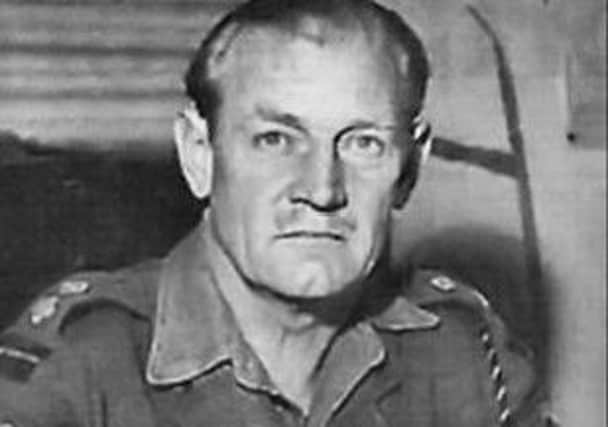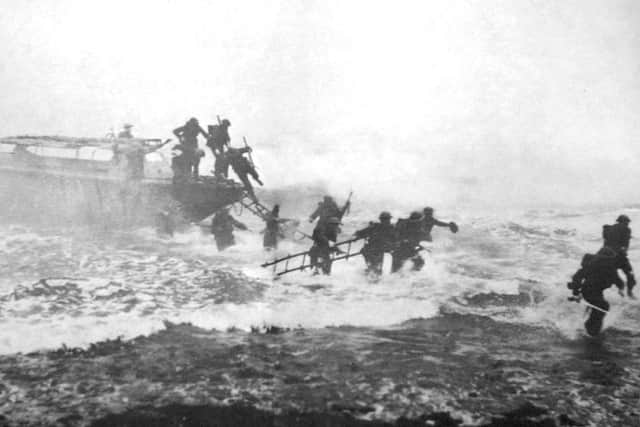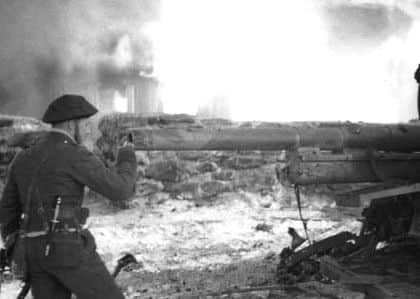Sword-brandishing war hero in kilt fired arrows at the enemy and played bagpipes


Anything goes, and more than occasionally there’s some uncertainty about whether or not the donated exhibit actually exists.
Past examples have included the Battle of Waterloo (offered by comedian Kevin Day), the Yeti (donated by actor Brian Blessed), a Second World War Anderson air-raid shelter (nominated by historian Gary Sheffield) and “absolutely nothing” (suggested by particle physicist Frank Close).
Advertisement
Hide AdAdvertisement
Hide AdThe curators, aided by the audience, decide if the exhibit should be included in the museum’s ever-increasing collection.


To date, just about everything offered has been accepted.
A recent exhibit, donated by satirist, impressionist and comedian Rory Bremner, was a war-hero known as ‘Mad Jack’ Churchill.
My attention was drawn immediately to the surname ‘Churchill’.
Roamer’s page has regularly shared memories and accounts from both World Wars, and more often than not reference has been made, directly or indirectly, to Winston Churchill.


Advertisement
Hide AdAdvertisement
Hide AdBut Bremner’s Churchill was John Malcolm Thorpe Fleming Churchill, born in Surrey on 16th September 1906.
When he died on 8th March 1996 a newspaper obituary described him as “the most dramatically impressive commando leader of the Second World War”.
He was renowned for advancing along enemy beaches, brandishing a traditional, basket-hilted Claybeg sword and dressed in his kilt; attacking and killing with a bow and arrow and playing his beloved bagpipes at moments of the most extreme danger.
Often wounded and mentioned in dispatches, and with a number of terrifying escapes to his credit, Lieutenant-Colonel Churchill was awarded multiple battle honours and given the nickname ‘Mad Jack’.


Advertisement
Hide AdAdvertisement
Hide AdOnce, when heavily outnumbered by an enemy ambush, he walked alone towards the ambushers brandishing a blackthorn stick and smiling widely.
He survived, later explaining: “People are less likely to shoot you if you smile at them!”
A newspaper obituary in 1996 stated: “Churchill believed an assault leader should have a reputation which would at once demoralise the enemy and convince his own men that nothing was impossible.”
He was also something of an eccentric!


After the Second World War, when working in central London, he sometimes shocked fellow-commuters on the train journey to his home by suddenly standing up and hurling his briefcase out of the carriage window.
Advertisement
Hide AdAdvertisement
Hide AdWhen he calmly sat down in his seat other passengers looked at him aghast, unaware that he had thrown the briefcase into his own back garden to save himself the task of carrying it home from the station.
Indeed, some of the Lieutenant-Colonel’s civilian activities were almost as impressive as his wartime feats.
He represented Great Britain in the 1939 World Archery Championships and played roles in films such as Ivanhoe and The Thief of Baghdad.
He bought and refurbished 11 old steamboats which he sailed up and down the River Thames; he built radio-controlled model boats, which he sometimes sold to hobbyists and he took part in motorcycling speed trials.
Advertisement
Hide AdAdvertisement
Hide AdHe was romantic and sensitive, an avid reader of history and poetry, knowledgeable about castles and trees, and compassionate towards animals and insects!
John Malcolm Thorpe Fleming Churchill was born in Surrey on 16th September 1906.
His father, Alex Churchill, was on leave from his Civil Service duties in Hong Kong and Ceylon.
After school and Sandhurst, Churchill was commissioned in 1926, went with the army to the far east.
Advertisement
Hide AdAdvertisement
Hide AdHe rode a motorcycle over 1,500 miles across India, at one point crashing into a water buffalo.
Posted from Rangoon to Maymyo he sailed up and down the Irrawaddy by boat, policing the river and its villages while mastering the bagpipes in his spare time.
He returned to Britain in 1936, retired from the army and Toured Europe, taking minor roles as an archer in movies.
He was recalled at the outbreak of the Second World War in 1939 and went to France with his Claybeg sword, kilt and longbow.
Advertisement
Hide AdAdvertisement
Hide AdHe made the last ever recorded bow and arrow kill when he shot a German officer in 1940 while holding the village of l’Epinette.
Churchill, wounded several times in France, was awarded the MC for heroism.
He joined the commandos in 1941 and was sent on a raid in Norway where he led the landing force ashore in his kilt, armed with his bow and arrows, sword in his belt, playing the bagpipes.
He led many heroic attacks, was often wounded and captured, twice escaping from POW camps.
Advertisement
Hide AdAdvertisement
Hide AdIn 1944, when a German mortar killed or wounded everyone around him, Churchill played ‘Will Ye No Come Back Again’ on his bagpipes as the Germans advanced to capture him and his comrades.
Taken captive and flown to Berlin for interrogation, as he was led from the German aircraft he tossed a lit cigarette back into it, setting the plane on fire!
He was recommended for the VC but eventually received the DSO.
Having fought on many fronts, he was posted to India shortly after Hiroshima and Nagasaki had been atom-bombed and the Second World War ended.
Advertisement
Hide AdAdvertisement
Hide AdSaid to have been unhappy with the sudden end of the war, some claim that Churchill quipped: “If it wasn’t for those damn Yanks, we could have kept the war going another 10 years!”
Churchill married Rosamund Denny in 1941 and had two sons, Rod and Malcolm.